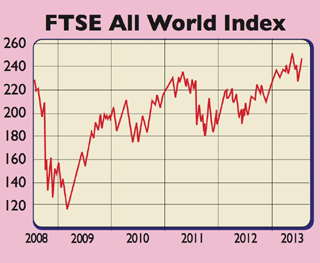Get the latest financial news, insights and expert analysis from our award-winning MoneyWeek team, to help you understand what really matters when it comes to your finances.
You are now subscribed
Your newsletter sign-up was successful
Want to add more newsletters?

Twice daily
MoneyWeek
Get the latest financial news, insights and expert analysis from our award-winning MoneyWeek team, to help you understand what really matters when it comes to your finances.

Four times a week
Look After My Bills
Sign up to our free money-saving newsletter, filled with the latest news and expert advice to help you find the best tips and deals for managing your bills. Start saving today!
The bulls are back. Last week saw America's S&P 500 index reach a new record. It is up by almost 20% this year. Global equities, as measured by the FTSE All World index, have also hit a post-crisis peak. A key sign of confidence, notes Jason Abruzzese in the Financial Times, is that defensive stocks are no longer spearheading the rally. In recent weeks, cyclical sectors, such as financials and industrials, have posted the biggest gains.
It's hard to share investors' enthusiasm. US data has improved but remain patchy. Elsewhere it's even less convincing. "Take the Western economies off the angel dust of money printing and super-low interest rates, and the current recovery' would disappear in a flash," says Jim Armitage in The Independent. Emerging markets are also slowing.
Note too, says Buttonwood in The Economist, that 52% of fund managers, according to a Bank of America Merrill Lynch global survey, expect global growth to accelerate. Yet economists' forecasts are being revised down. So investors look complacent about world growth. With growth easing, we can't count on profits to provide much momentum, not even in America, where S&P profits have hit record highs thanks to unusually wide margins. These are now far more likely to narrow than widen further, as margins tend to revert to the mean.
MoneyWeek
Subscribe to MoneyWeek today and get your first six magazine issues absolutely FREE

Sign up to Money Morning
Don't miss the latest investment and personal finances news, market analysis, plus money-saving tips with our free twice-daily newsletter
Don't miss the latest investment and personal finances news, market analysis, plus money-saving tips with our free twice-daily newsletter
And sales growth has been nothing to write home about. The earnings picture outside the financial sector is "very weak", says Sheraz Mian of Zacks.com. It hardly appears to justify further rapid stock-market gains. Then there's the euro crisis, which policymakers hope can be put on ice until after the September elections in Germany. But given the political upheaval and fragile coalitions in the south, "there is plenty of scope for nasty surprises in the meantime", says Buttonwood.

Is the post-2000 bear finally over?
US valuations, as measured by the cyclically adjusted price-to-earnings ratio (Cape), peaked in 2000 and are still above the historical average. The economic backdrop also suggests we're still in trouble. The credit bubble burst five years ago following the dotcom bust, but we've barely worked off any debt or made a lasting recovery. By contrast, the 1982-2000 bull was marked by the defeat of inflation and falling world interest rates.
Since the bounce in 2009, markets have trended sideways: rising when more liquidity seemed nigh, but capped by the slow recovery amid historically high debt loads, or by fears of tighter money. Until we shake off the credit bubble hangover, the new secular bull is unlikely to begin. That's not to say stocks are a write-off or that the pattern is identical across the developed world. Japan has been in a secular bear since 1989. Some continental markets have reached single-digit Capes that presage appealing long-term returns. But the roaring 1980s and 1990s are unlikely to return soon.
Get the latest financial news, insights and expert analysis from our award-winning MoneyWeek team, to help you understand what really matters when it comes to your finances.
MoneyWeek is written by a team of experienced and award-winning journalists, plus expert columnists. As well as daily digital news and features, MoneyWeek also publishes a weekly magazine, covering investing and personal finance. From share tips, pensions, gold to practical investment tips - we provide a round-up to help you make money and keep it.
-
 Should you buy an active ETF?
Should you buy an active ETF?ETFs are often mischaracterised as passive products, but they can be a convenient way to add active management to your portfolio
-
 Power up your pension before 5 April – easy ways to save before the tax year end
Power up your pension before 5 April – easy ways to save before the tax year endWith the end of the tax year looming, pension savers currently have a window to review and maximise what’s going into their retirement funds – we look at how

